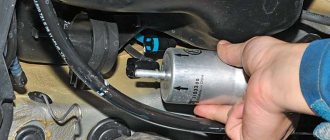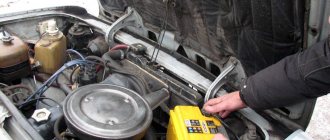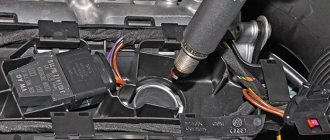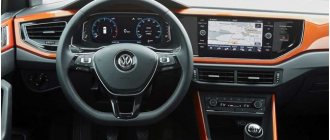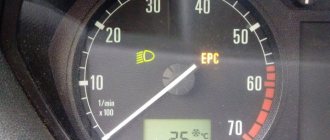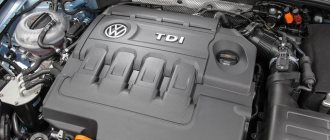Volkswagen is one of the most famous and largest automakers in the world. The annual sales volume is as close as possible to the leader, the Japanese concern Toyota.
At the same time, Polo rightly belongs to the list of the most popular models. This is a compact car from a German manufacturer that has been produced for decades. Moreover, the car is presented in several body versions, including a sedan, hatchback and station wagon.
Since 2010, a model called Polo Sedan has been assembled especially for Russia. There is little in common with the original Polo, except for the name. In fact, these are different cars. Although when deciding on the selection of a new battery, there is a lot in common between them. You can choose the same batteries, and the replacement process is no different.
Features of original batteries
To select a battery for a Volkswagen Polo, you need to study the original power source and look at its characteristics. Volkswagen Polo in sedan, hatchback and station wagon body styles can be equipped with various batteries. Therefore, it is better to choose a battery based on the parameters of the original battery provided by the factory.
Polo has been produced since 1975, and the latest generation was introduced in 2022. This has already become the 6th generation in the entire history of the model.
During this period, the car was constantly modernized, more modern and powerful engines were installed on it, and a large number of energy consumers and systems appeared that depend on the battery. Therefore, the battery parameters gradually changed towards increasing and improving.
All Volkswagen Polo vehicles require the use of batteries with a voltage of 12 V and reverse polarity.
Otherwise, they can differ greatly from each other.
When choosing a battery, you should focus on reverse polarity. Moreover, this also applies to the Polo Sedan version for the Russian market, where traditionally domestic cars have straight polarity. Polo Sedan, although with a stretch, can be considered a foreign car.
- Capacity. For Volkswagen Polo cars, including the Polo Sedan, it is possible to use a battery with a capacity ranging from 40 to 80 Ah. These are the batteries that are installed on the car from the factory;
- Starting current. The minimum cold cranking current rating for standard batteries supplied from the factory is 380 A. And the maximum standard battery capacity is 760 A;
- Dimensions. There are several standard sizes of installation sites for batteries. The Volkswagen Polo is equipped with batteries with dimensions of 207x175x175 mm, 242x175x190 mm, 207x175x190 mm, 278x175x190 mm, 242x175x175 mm, 278x175x175 mm.
If we talk about the last two generations of Volkswagen Polo cars, including the Polo Sedan, they use batteries with the following range of characteristics:
- Polarity. Everywhere it is the opposite. Batteries with straight polarity are not suitable for Polo;
- Capacity. Selectable from 52 to 70 Ah. In some cases, if additional equipment is used, the capacity can be increased to 75–80 Ah;
- Starting current. The minimum recommendation is to take a battery with a cold cranking current of 430 A. But it is better to focus on numbers from 550 to 700 A for Russian conditions;
- The battery type is European, with standard recessed terminals;
- The length can vary from 241 to 246 mm, and the width literally from 174 to 175. In height, these can be batteries from 174 to 190 mm.
These are the dimensions you should focus on when choosing a battery for a Polo or Polo Sedan.
Choosing a storage device for a Volkswagen Polo car
The battery plays an important role in the functioning of the Volkswagen Sedan.,
Without it, the engine will not start, and electronic devices cannot be turned on. Even the alarm won't beep. This model must have a storage device installed with the following parameters:
- The battery must be of reverse polarity, that is, have a right positive;
- meet the European standard - 60–64 Ah;
- the starting current must be at least 540 A;
- the presence of a lower side is mandatory, since in this model the battery is secured using this side;
- The dimensions of the storage device must have the following parameters:
- width—175 mm;
- height—175 mm;
- length—245 mm;
If these dimensions do not match, the battery cannot be securely secured in the socket.
Replacement options
Naturally, the car owner will be faced with the question of which battery will be better and preferable for him to choose for his German passenger car Volkswagen Polo.
The range is truly extensive, and everyone can find the best option for themselves in terms of cost, characteristics and other important and significant individual parameters.
Before purchasing, you should look at the technical documentation or determine the characteristics of the standard battery for Volkswagen Polo by VIN code.
This will make it clear exactly which factory version of the battery is used on a particular generation and modification of the Volkswagen Polo car.
A fairly good option is to buy an original battery, which again can be found by VIN code or based on technical documentation. But this is quite an expensive pleasure, plus it is not always possible to quickly get the desired product.
Taking into account all these factors, car owners most often choose among analogues. They can be divided into 3 price categories:
- budgetary;
- mid-budget;
- expensive.
For the most economical or those who cannot yet afford to buy a more expensive battery model, the following options from the category of budget batteries are suitable:
- Russian Star 60R;
- Attack 60R;
- Autofan 60R;
- Uno 60R;
- Tyumen Standard 60R;
- Tyumen Premium 60 and 64R;
- Inci Aku Supr A 60RS;
- Akom 55R;
- Bosch S3 005;
- Mutlu Mega Calcium 60R.
These batteries cost up to 4.5 thousand rubles. The first models can be purchased for literally 2000–2500 rubles.
But it is still more correct when selecting a battery for cars such as the Volkswagen Polo to focus on the mid-budget category of batteries. And if possible, take proven, maintenance-free batteries from leading manufacturers.
The category of mid-budget power supply devices includes:
- Thomas 60RS;
- Blizzaro Silverline 60RS;
- Varta Blue D24;
- Varta Blue D59;
- Bosch S4 005;
- Bosch S4 004;
- Hankook 60R;
- Akom EFB 60-62R;
- TAB Polar S60R;
- Exide Excell EB602;
- Bost Premium 65R;
- TAB Magic 62R;
- Topla Top 62RS;
- Exide Premium EA612;
- Varta Silver D15.
This selection contains batteries suitable for the Volkswagen Polo, in the price range from 4.5 to 6 thousand rubles.
If a motorist is ready to part with more than 6 thousand rubles, but at the same time give money for a really good battery, then it is worth taking a closer look at the following options:
- Alphaline Ultra 62R;
- Banner Starting Bull 62R;
- Moll Kamina Start 62RS;
- Exide Premium EA640;
- Exide Start Stop EFB EL600;
- Moll M3plus 60R;
- Varta AGM D52;
- Alphaline AGM 60R;
- Exide Start Stop AGM EK600;
- Deka 647MF;
- TAB AGM 60R;
- Moll AGM Start Stop 60R.
These are excellent batteries for Volkswagen Polo cars of the last two generations. But their cost varies from 6-7 to 10-12 thousand rubles.
If the owner of a relatively budget car Polo Sedan or regular Polo is ready to shell out that amount, you can safely count on a service life of more than 4–5 years.
When buying budget batteries, you should not expect them to work for more than 3-4 years.
Many cheap batteries fail after 1–2 years from the start of operation. Plus they are mostly maintenance or low maintenance. And this means additional costs in time and effort for adding distilled water, monitoring the level and density of the electrolyte and other maintenance procedures. In this regard, buying maintenance-free batteries is much more profitable.
Determining the quality of a battery
The quality of the battery must meet many parameters.
Let's look at the two main characteristics:
- Durability of the device. It is determined by the ability of the battery to maintain its basic properties for an estimated time. When the vehicle is moving, the battery is automatically recharged. Therefore, it practically does not discharge. When the battery has completely exhausted its potential resource, it must be replaced. The average estimated operating time of storage devices must be at least three years.
- The amount of current that comes from the starter. The most important purpose of the battery is to start the engine. When the ignition key is turned, the storage device must supply an electrical current to the starter, which starts the engine. The motor starting current is the number of amperes generated in half a minute. This indicator is not constant; when operating at low temperatures, it always becomes lower. The optimal value is considered to correspond to more or less starting current if the ambient temperature is 27 degrees. For a Volkswagen Polo model car, this figure is 260 A. The less it changes at different temperature conditions, the better the storage device is considered.
Self-replacement
Now directly to the question of how to remove the battery on the latest generation Volkswagen Polo yourself.
Moreover, the same instructions are suitable for removing the battery from the Volkswagen Polo Sedan, the most common in Russia. After all, this model was created specifically for the Russian market and is assembled at the facilities of a domestic enterprise.
In itself, replacing the battery in a passenger car like a Volkswagen Polo should not cause problems even for a beginner. The car owner will only need to unscrew the fasteners and remove the battery from his Polo, and then install a new starter battery.
Volkswagen Polo has a standard battery arrangement. The battery is located in the engine compartment.
In order for the replacement and installation of the battery on the Polo and Polo Sedan to proceed without problems, it is important to follow a certain sequence. The instructions can be presented as follows:
- stop the engine, turn off the ignition and remove the key from the lock;
- make sure that all consumers are disconnected from the on-board network;
- lift the hood and secure it;
- using an open-end or socket wrench 10, loosen the fastening of the negative terminal, from which battery removal always begins;
- remove the terminal and move the negative wire to the side so that it does not accidentally return to contact with the battery;
- there is a protective cover above the positive terminal, to remove which you need to simultaneously press two latches on both sides;
- lift the protective cover;
- using the same 10mm wrench, loosen the wire on the positive terminal;
- unclip the fuse box fasteners;
- remove it and take the wire to the side;
- It is important not to let the positive wire touch metal surfaces of the body;
- the wire of the positive terminal and the fuse box are moved to the side;
- Using a 13-mm socket and an extension, now unscrew the mounting bolt of the bracket, which is responsible for fixing the battery;
- Now carefully remove the battery from its seat.
It is clearly seen that replacing the battery yourself on a car like a Volkswagen Polo is not difficult.
When reinstalling, first connect the positive terminal, and only then can you connect the negative terminal.
A battery that meets factory recommendations must be installed under the hood of a Volkswagen Polo. But you can select a battery with a slight bias towards increasing the recommended parameters. The same capacity can be increased by 5–10 Ah, but no more.
More information about batteries for Polo
New cars have a battery installed at the factory. It is designed for approximately five years of standard use. However, by following all the rules, you can extend the life of the battery to eight years. After this, problems will inevitably begin: the battery will quickly lose charge, power will drop, and at the decisive moment it will not be possible to crank the crankshaft and start the engine. It is better to prevent such problems and promptly replace the factory unit with the same new one or an equivalent one.
Original and analogues
VW Polo cars are equipped with batteries from the German company Varta. Their characteristics:
- capacity: 60 Ah;
- dimensions: 242 by 175 by 190 (175) – dimensions in millimeters;
- starting current: 550 – 650 A;
- polarity: reverse.
If you have any doubts during the selection, use the catalog numbers (articles): If you have any doubts during the selection, use the catalog numbers (articles):
- 566047051;
- 560410054;
- 561400060;
- 560408054;
- 563400061;
- 560409054;
- 560901068.
This way you definitely won’t go wrong with a specific battery model. However, you can install a battery from another manufacturer in your car. Basic conditions: compliance with technical specifications. If you “fly” with the dimensions, the battery simply will not fit into the seat intended for it.
When purchasing, it is allowed to install batteries with increased power up to 65 Ah, but no more. With a capacity exceeding 70 Ah, the generator is overloaded and the battery is undercharged, which negatively affects both its service life and starting performance.
Of the equivalents, the best are Bosch batteries with catalog numbers:
- 0092S40040;
- 0092S50040;
- 0092S4E050;
- 0092S40050;
- 0092S50050.
You can also use batteries from other manufacturers: Mutlu, Tymen Battery, Exide. Since all batteries are produced with standard parameters, it all depends on the owner’s wallet: the cheaper the battery, the more potential problems there will be with it.
We select and independently change the Volkswagen Pol sedan car battery
Russian winters. the coldest and most merciless natural phenomena. Even equipment sometimes breaks down, bending under the pressure of 30-degree frost. Probably the only country that could resist the onslaught of futuristic car conquest by pretending to be in sci-fi movies. It's Russia. Any robot will simply turn into useless hardware: the battery will be discharged twice.
This is why our motorists suffer from severe weather every year. While running around the yard early in the morning, they will open the hood and wait for friends or relatives to arrive and provide the necessary light.
However, cold winters are only a catalyst for the problem. in conclusion , He knew that the battery was old and there was practically no charge. I wanted to change it in the summer, buy a new one and close the issue. But my hands did not reach me. And now you're jumping from one foot to the other, trying to stay warm. punishment with all the severity of a fearless deed.
Typically, the battery life of cars is about 5 years (provided that the resource is used wisely and without naive “delay”, like “forgot to turn off the lights when leaving the car at night”).
Mechanical damage, such as cracks in the housing through which electrolyte leaks, can also cause rapid wear of the device. If this is a malfunction, it is better to replace the damaged battery with a new one. Attempts to resurrect the device. This is not a good option for the further successful operation of the car. The chemicals that fill the battery compartment are very aggressive. If they damage vital parts of the car, the car owner will have to replace not only the culprit, but also any damaged equipment under the hood.
Wherever the famous German Volkswagen Polo sedan is assembled, the same parts are used in all variants of the car. Including battery.
